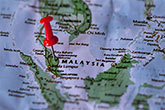EM&I technology avoids dry docking costs
Published by Nicholas Woodroof,
Editor
Oilfield Technology,
These often involve the use of divers which is difficult, dangerous, weather dependent, and costly, usually requiring a dozen or more people on board (POB) or a dive boat for an indeterminant period.
The joint industry project (JIP) for hull inspection techniques and strategy (HITS) which has been led by EM&I for the last 6 years on behalf of the floating production storage and offloading (FPSO) Global Research Forum, set out to solve this problem and have guided the development of the ODIN® diverless alternative which has been used successfully on dozens of FPSOs, drillships and semi submersibles throughout the world.
The ODIN technology involves the use of deck launched inspection class remotely operated vehicles (ROVs) to inspect the hull and all the appendages and clean (where necessary) the inlet grills to seachests and anchor chains, etc. They can also insert inflatable bladders into discharge valves and measure anchor chain links for wear and corrosion.
This has also been further developed to inspect valves in operation by inserting specialised cameras (from the nuclear industry) on manipulators through class approved access ports adjacent to the valves concerned. This enables the valves to be inspected while the vessel is on station, on hire, and in operation.
Not having to use divers and only requiring a small team of 3-4 technicians for a limited period has made significant cost savings of over 50% and POB savings of over 70%.
“Not having to come off station and into dry dock could make a considerable contribution to the profitability of FLNG and FSRU operations as well,” commented Danny Constantinis (Executive Chairman) of the EM&I Group. “We are setting up a new JIP for the floating gas industry to help resolve some of the common problems and agree safety standards. The special environmental considerations for FSRU’s moored close to the shore or conurbations also need to be considered carefully. The first meeting was held in Singapore last April, and the next meeting will be held in Houston this October."
Read the article online at: https://www.oilfieldtechnology.com/drilling-and-production/03092019/emi-technology-avoids-dry-docking-costs/
You might also like
Velesto secures PTTEP drilling contract for NAGA 5 in 2025-26 campaign
Under the contract, Velesto will assign NAGA 5, one of its premium jack-up rigs, to drill a firm 15 wells with operations scheduled to commence in June 2025.

